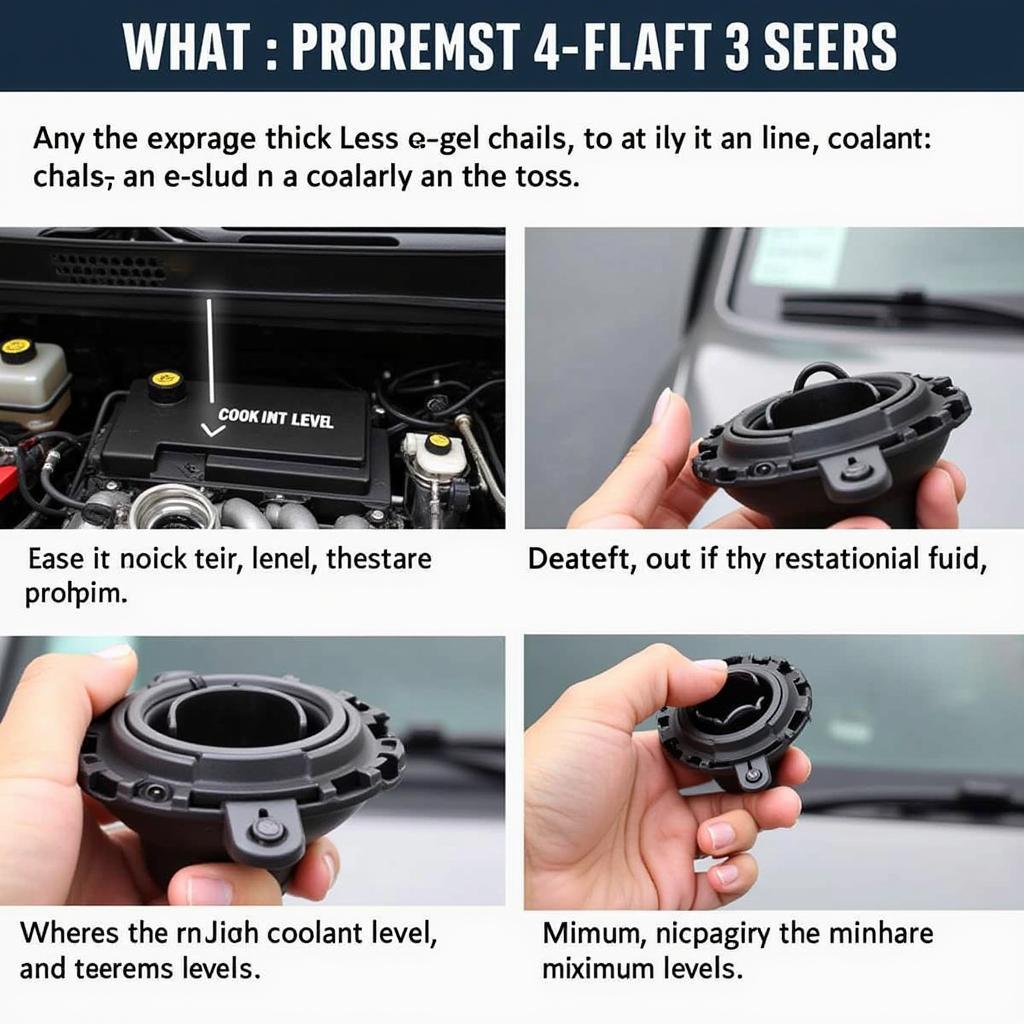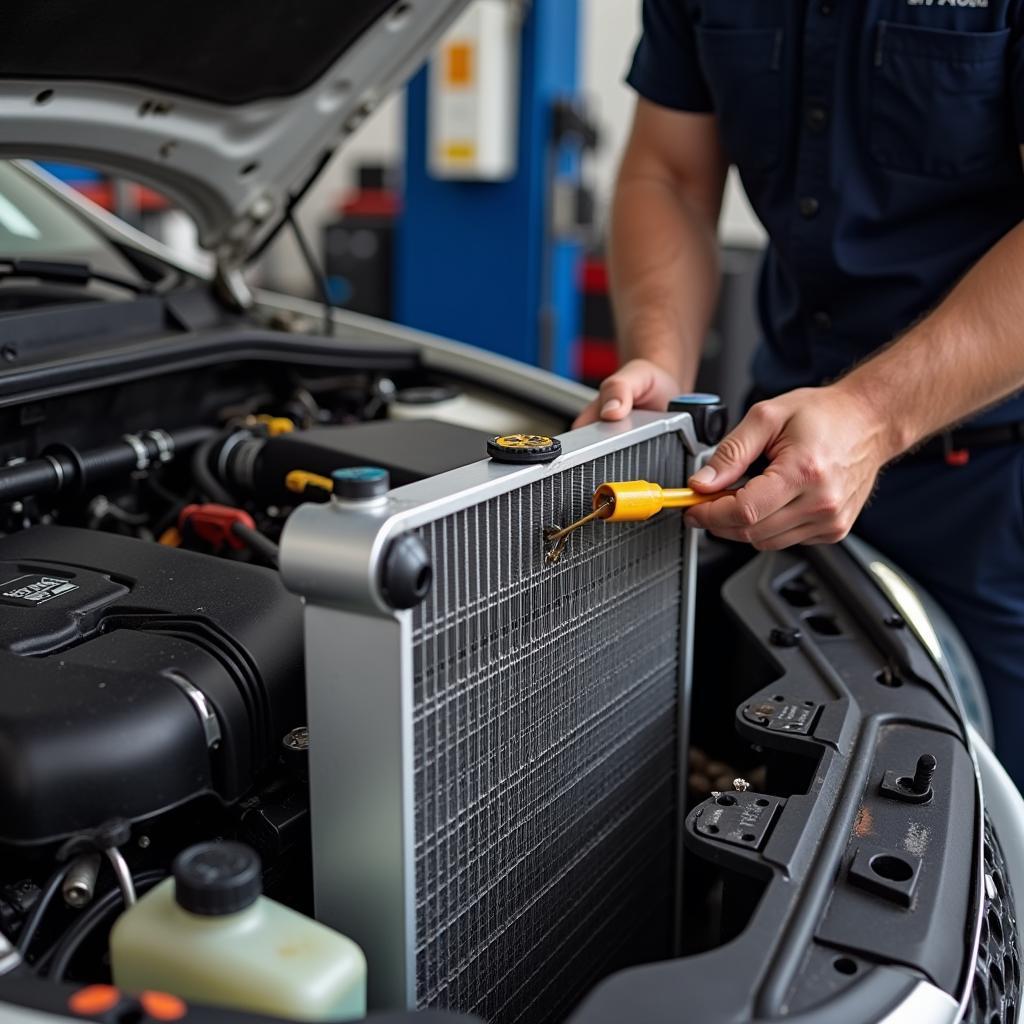Overheating is a common car problem, especially during hot weather. If your car is overheating, it’s crucial to address the issue quickly to prevent serious engine damage. This guide provides a comprehensive overview of How To Fix Car From Overheating, covering various causes and solutions. Learn how to diagnose the problem and implement the right fix, whether it’s a simple DIY task or requires professional help.
Common Causes of Car Overheating
Several factors can contribute to a car overheating. Identifying the root cause is the first step towards fixing the issue. Some of the most common culprits include a low coolant level, a faulty thermostat, a malfunctioning water pump, a clogged radiator, or even a leaking head gasket.
Low Coolant Level
Perhaps the most frequent reason for overheating is simply a low coolant level. Coolant, also known as antifreeze, is vital for regulating your engine’s temperature. Regularly check your coolant levels and top it up if necessary. Always use the correct coolant type recommended by your vehicle’s manufacturer.
 Checking Car Coolant Level
Checking Car Coolant Level
Faulty Thermostat
The thermostat regulates the flow of coolant through the engine. A stuck-closed thermostat prevents coolant from circulating, leading to overheating. Replacing the thermostat is usually a straightforward and relatively inexpensive fix.
Malfunctioning Water Pump
The water pump circulates coolant throughout the cooling system. If the water pump fails, coolant can’t circulate effectively, resulting in an overheated engine. Signs of a failing water pump can include strange noises, leaks, or a consistently overheating engine.
How to Fix Car Overheating: A Step-by-Step Guide
If your car starts overheating, follow these steps:
- Pull over safely: Find a safe place to pull over and turn off the engine.
- Let the engine cool: Do not attempt to open the hood immediately, as the engine and coolant will be extremely hot. Wait at least 30 minutes for the engine to cool down.
- Check the coolant level: Once the engine is cool, carefully open the hood and check the coolant level in the reservoir tank. If the level is low, add the correct coolant type.
- Inspect for leaks: Look for any signs of coolant leaks around the hoses, radiator, and water pump.
- Check the radiator fan: With the engine running, ensure the radiator fan is operating correctly.
- Seek professional help: If you can’t identify the problem or if the issue persists, take your car to a qualified mechanic.
Quick Fixes for Overheating on the Road
Sometimes, you might experience overheating while driving and need a quick fix to get to a safe location. Turning on the heater can temporarily draw heat away from the engine. However, this is only a temporary solution, and you should still address the underlying cause as soon as possible.
“A quick fix for an overheating engine is to turn on the heater full blast. It sounds counterintuitive, but it can pull enough heat from the engine to buy you some time.” – John Smith, Automotive Engineer.
Can an Overheating Car Be Fixed?
can an overheating car be fixed
In most cases, an overheating car can be fixed. The cost and complexity of the repair depend on the underlying cause. A simple coolant top-up might be all that’s needed, while a damaged head gasket can require extensive repairs.
 Mechanic Repairing a Car Radiator
Mechanic Repairing a Car Radiator
How to Fix Car Engine Overheating: Preventative Maintenance
how to fix car engine overheating
Regular maintenance is key to preventing car overheating. This includes:
- Regularly checking coolant levels: Make it a habit to check your coolant levels at least once a month.
- Flushing the cooling system: Flush and refill your cooling system according to your vehicle’s manufacturer recommendations.
- Inspecting hoses and belts: Regularly inspect hoses and belts for signs of wear and tear, replacing them as needed.
- Checking the thermostat: Have your thermostat checked periodically, especially if your car is older.
“Preventative maintenance is the best way to avoid overheating problems. Regularly check your coolant, hoses, and belts, and have your cooling system flushed as recommended.” – Maria Garcia, Certified Mechanic.
Conclusion
Knowing how to fix car from overheating is essential for every car owner. Understanding the common causes, implementing quick fixes, and performing regular preventative maintenance can help you avoid costly repairs and keep your engine running smoothly. Remember, if you encounter persistent overheating issues, consult a qualified mechanic for a proper diagnosis and repair. Contact us at AutoTipPro for further assistance at +1 (641) 206-8880 or visit our office at 500 N St Mary’s St, San Antonio, TX 78205, United States.
FAQ
- What should I do if my car overheats while driving?
- How often should I check my car’s coolant level?
- What are the signs of a failing water pump?
- Can I drive my car if it’s overheating slightly?
- How much does it cost to fix an overheating car?
- Is it dangerous to drive an overheating car?
- How can I prevent my car from overheating?




Leave a Reply